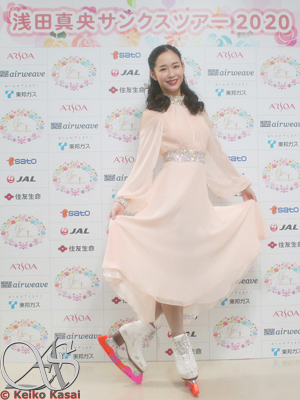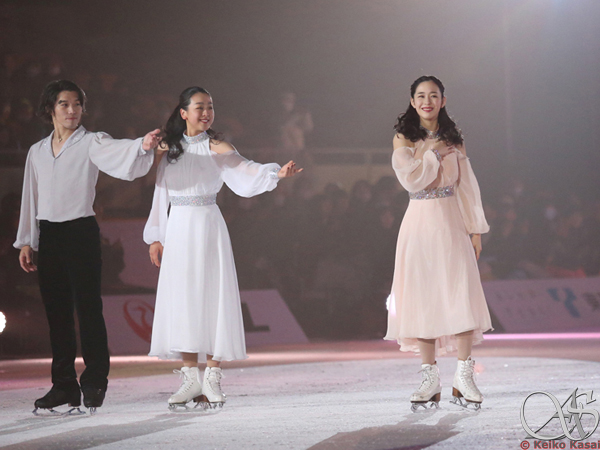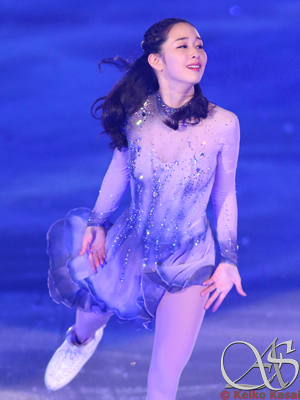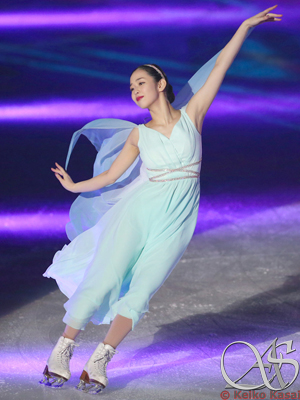Haruka Imai: "I regained the joy of skating"
May 3, 2020
By Atsuko Kuryu
Photos © Keiko Kasai
 Some skating fans might remember Haruka Imai, the Japanese junior national champion and silver medalist of the Asian Winter Games. She was also the winner of the 2010 and 2013 Ondrej Nepela Trophy and she competed in several Grand Prix events, as well as in the 2014 Four Continents where she placed 4th. If you're wondering what she does now, here are some answers as Haruka took time to be interviewed during Mao's tour. Haruka talked about her life as a figure skater and her life after retirement.
Some skating fans might remember Haruka Imai, the Japanese junior national champion and silver medalist of the Asian Winter Games. She was also the winner of the 2010 and 2013 Ondrej Nepela Trophy and she competed in several Grand Prix events, as well as in the 2014 Four Continents where she placed 4th. If you're wondering what she does now, here are some answers as Haruka took time to be interviewed during Mao's tour. Haruka talked about her life as a figure skater and her life after retirement.
Mao's Thanks Tour
I regained the joy of skating.
How did you come to join this show, and how do you feel about it now?
It was last January; Mao Asada invited me to her tour. I had never thought I would skate like this again! It was very hard for me at first, because my body did not move like I wanted, but taking part of this wonderful show, I felt like I regained the joy of skating.
What do you do in this show?
I have two solo parts: "So Deep in The Night" and a tango program in the latter part. The first is to beautiful music, which I remember very well when Mao skated to as an eligible skater. I liked it very much! And there are group numbers.
You are far ahead in terms of achievements, and people most likely know your name better than the other female cast members, except Mao. Does that make you conscious about your role in the tour?
Well... I honestly don't have any such awareness. I am a new member of this tour; this is my first year but the third year for some of the others. So I don't feel like I have to lead anyone else. To tell you the truth, there was only a month from the time of Mao's invitation until the first performance, and I had to learn the choreography of my solo parts and the group numbers, and fit in well with the team as well. On top of that I had to master using props like a ribbon, ball and more, and I never did any of that as a competitive skater. So I had to get used to them and I was especially conscious about moving together with others in the group numbers. I had no time to even think about taking on a leading role.
What do you think was the best thing about joining this tour?
The best thing... well... I was so frustrated after I decided to retire. Everything went bad; I wanted to practice but couldn't because hard work made me injured! I didn't enjoy skating anymore. I had temporarily lost my desire to skate, but now, on this tour, I can feel the joy of skating again and it's fun!

What is your friendship with Mao and Takahito Mura like?
We got to know each other more than 10 years ago when we went to the international competitions together several times. We know each other very well! So thanks to them, I wasn't worried about joining the tour. When I was in elementary school I very much looked up to Mao. If I had a time machine, I would go back to that time and tell my little me that I'm on tour with Mao now. I can only imagine how delighted my 9-year old self would be. Of course, my present me is very happy too!
Retirement
I just thought it was time.
You mentioned your retirement, how did you decide?
There was this vicious cycle of practice and injury, and in all that, I had to compete. I wanted to train hard for those competitions, but my situation didn't allow me to do so. I faced a dilemma and struggled with the fact that I was not able to do things like when I was younger. I was 24 at that time. So I just thought it was time.
 You practiced in Niigata, far from your coach. Was that a factor?
You practiced in Niigata, far from your coach. Was that a factor?
It could have been. But that was just one of the factors. I think the biggest thing was that I wasn't able to jump like I had been when I was younger. I felt like I was able to move less and less too.
Had you decided what to do after retiring?
No, not at all. I hadn't even thought about it so I was wondering what I should do, where I should go at the moment of retirement.
Life as a coach and professional skater
I have my hands full.
Do you teach in Niigata now?
No, I don't, I teach at the Higashi-Yamato Skating Center in Tokyo. I started my skating career there, and even while I was in Detroit, I practiced there whenever I was back in Japan. And my mentor, Rumiko Michigami, is there. It is the rink where I feel the most at home.
How do you divide your time between being a coach and being a skater? How are you able to maintain your technical skills?
It is very difficult. I spend lots of time coaching my students, but I have to practice a lot as well. It is daily routine of practicing, teaching, practicing, teaching... I try to do as much as possible of both, but the biggest problem is to find a time and place to practice. And I also have to take care of my body.
It must be busy and hard.
Yes. I have my hands full.
Please tell us about your students.
The most advanced student can land triple jumps. The youngest one is in 4th grade (of elementary school). I also teach a Vietnamese girl. When I'm not with her, like when she goes back home or I take off, I teach her online.
Will you focus on teaching after this tour is finished?
Yes, I will. I have some students of my own, but in addition to that, I give individual instructions of spins and skating according to other coaches' requests.
.jpg)
Competitive seasons
At first, I went to the rink just to play with my cousin.
You started skating when you were 9, right? Is that not a late start as a figure skater?
Yes, I started at age 9. But I didn't stand out when I was a novice, and always failed to qualify at local competitions. I was no good until I was in junior high.
But you became the junior national champion in 8th grade! That seems like quick progress.
Well, in 8th grade I qualified for the junior nationals for the first time. I finished 7th and was chosen to level B elite skater. It was the following year that I became the junior champion. It might seem that I achieved success quickly, but it didn't feel like it at the time. When I started skating at 9, I didn't even think of competing, I just skated for fun. At first, I went to the rink just to play with my cousin. But once I competed, I wanted to skate better, I wanted to level up. So practices became more and more frequent and finally I was at the rink every day.
Did your coach ask you to take skating more seriously then? 
Yes, she did. It didn't work out at first, but finally bore fruit as I kept going without giving up. I was able to land all the triple jumps when I was in 8th grade and became one of elite skaters, who can use the national training center at Chukyo University. There I could practice with the top skaters at that time, such as Mao, Miki Ando and others. Under those circumstances I could learn a lot as I watched them. I think it was the reason why I could win junior nationals the following year.
What advice would you give young people who want to start skating?
It would have been nice if I could have started earlier, I think the earlier, the better. However, you don't have to give up because you feel you are too old. I just want them to enjoy figure skating.
You went to the Detroit Skating Club in the middle of your career. How come you decided to go there?
I went there at the autumn of 2011, after having had my choreography done there in the spring of that year. I recognized that there were three rinks in the club, while we only had one in Japan. In Detroit you could practice all day, and I thought that would be the best for my skating.
What do you think you gained there?
I think skating skills and spins. When I was a junior, I focused on jumps. I thought it would be enough if you could jump cleanly. In Detroit, as I was taught by Yuka Sato, I recognized just how important skating skills and other elements are. She definitely taught me about those.
Besides the rink situation, were there any differences in teaching?
I can't really say because I have no other experience. But there were more private lessons in Detroit and more group lessons in Japan. Perhaps it depended on the coach, but Yuka gave one-on-one lessons most of the time.
A very concentrated lesson, right?
Yes, I think so.
Many Japanese skaters go abroad for lessons. What do you think, is it a good thing to do or can they can learn enough in Japan?
To tell you the truth, considering the multiple rinks and other circumstances, I think training abroad is a better option. However, I think you can also learn enough in Japan.
What if your students want to go abroad?
If he/she wants to, I'll willingly send him/her off.
.jpg)
Coaches and Choreographers
Oh, how many coaches I have worked with!
You have experienced many coaches. Can you specify what you learned from each one?
My first coach was Yutaka Doke, who is the father of Nagisa Hayashi, one of the skaters in Mao's tour. From him I learned that skating is fun! If it hadn't been for him, I probably would have quit skating in less than a year. My next coach was Yuki Sugiura who taught me as I became a junior national champion. I went to lots of rinks, like Jingu, Higashi-fushimi, even to the far away Chukyo, to practice, and she went with me anytime. Without her empathetic care, I would not have won the junior nationals. Then I moved my training to the Chukyo rink to be taught by Yutaka Nagakubo. He has a team-teaching system, where many coaches teach different elements in detail. I was in the very difficult process of transitioning from junior to senior, and they supported me very well. And then I went to Detroit to be taught by Yuka Sato. Oh, how many coaches I have worked with! I mainly learned about skating skills and spins there as I mentioned before. In this period, .jpg) Rumiko Michigami worked with me while I practice in Japan for a while. Then, I finally came back to Japan, and Ms. Michigami took care of me. She's like a mom to me and I felt calm about competing, because I knew she would accompany me.
Rumiko Michigami worked with me while I practice in Japan for a while. Then, I finally came back to Japan, and Ms. Michigami took care of me. She's like a mom to me and I felt calm about competing, because I knew she would accompany me.
Based on that experience, what kind of coach do you want to become?
I want to be a coach who can teach according to each skater's wish and goals. If he/she wants to enjoy skating I want to teach them how to have fun while skating. And to someone who aims for the top level, I want to give intense lessons so that he/she can become a better skater than I was.
You have also worked with several choreographers. Who has impressed you the most?
Well, the choreographers whom I worked with in my last year as a competitive skater were Pasquale Camerlengo and Phillip Mills. It was very interesting because they were completely opposite. Philip was so elaborate that he would write down all the elements and composition long before he started to choreograph. Once he was on ice, almost everything was complete and ready to start. His instructions were very detailed, and he required skating in such way that the music and movements were in tune with each other everywhere in the program. In contrast, Pasquale was very free. The day I arrived in Detroit to be choreographed, he had not decided on the music yet. We discussed what music we should choose then. And the next day, when the arrangement was not yet finished, he said, "Let's start choreographing first". He said "do this" one day, but changed it the next. It was a very interesting experience for me. And astonishingly, both programs turned out equally fantastic!
And you were choreographed by Olympic gold medalists, Natalia Bestemianova and Igor Bobrin. How did you meet them?
 I met them at a skater's camp. Actually, they did not choreograph my program from the beginning, but they reworked the previous programs: "Polovtsian Dance" and "Songs Without Words" by Felix Mendelssohn. They always choreograph together, and their way of choreographing is completely different from Phillip or Pasquale. They talked to each other and came up with new ideas all the time. I think they are very knowledgeable about art.
I met them at a skater's camp. Actually, they did not choreograph my program from the beginning, but they reworked the previous programs: "Polovtsian Dance" and "Songs Without Words" by Felix Mendelssohn. They always choreograph together, and their way of choreographing is completely different from Phillip or Pasquale. They talked to each other and came up with new ideas all the time. I think they are very knowledgeable about art.
Haruka's Message
If there is a request, I will willingly go and teach.
What do you think about the second career of figure skaters?
I think that it is a very difficult issue. Skaters now seem to have only three choices: to become an instructor, a professional skater, or working for the national federation, this is if they want to use their skating knowledge and experience. But the last one seems not to be easy for the most skaters. I think you need to start thinking about your second career while you are still eligible.
There is a growing number of adults who want to start skating as a hobby. Do you think you could teach them?
Oh, yes! I actually teach some adult skaters already. If there is a request that they want me to teach, I will willingly go anywhere.
How do they get in touch with you?
Look at my Instagram ( @haruka_imai_831 ), you will find my e-mail address there.
Do you have any advice for the young skaters?
The progress of technique has been remarkable recently, and even girls jump quadruples. As a result, their life as figure skaters tends to be short, and I want young skaters to be careful about injuries and enjoy skating for a long time.
This is the last question: your retirement happened a bit suddenly; do you have a message for your fans?
Yes! I would love for you to come and watch the show! I'm working very hard so you can enjoy my best performance. I also post on Instagram to communicate with you, so please join. I will do my best to keep doing something that will please you all.
.jpg)



